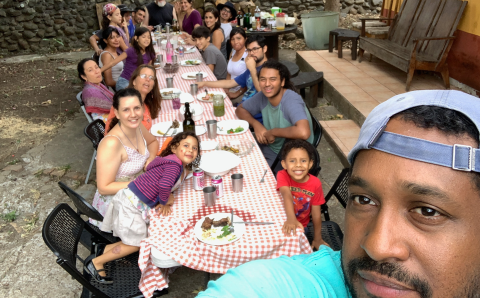Editor’s note: This article is the fourth in our series, “Seeking Shalom in the Midst of Polarization.” The series, in collaboration with The Colossian Forum, aims to examine the state of polarization in the U.S. and Canada and explore Christian strategies to overcome it. To read more articles in the series right now, visit TheBanner.org.
It’s difficult to handle disagreements, especially when we care passionately about an issue and have concerns about the assumptions behind or implications of other perspectives. Yet, how we engage division within the body of Christ is important—and not just because getting the issues right matters. How we engage one another in the midst of conflict shapes us and our communities. It can also strengthen or undermine our witness to a watching world. If Christians are to confront divisive issues faithfully in the context of our current culture of polarization, we need to reimagine what communication in the face of conflict might look like as well as what it might help us accomplish. By expanding our imaginations and reforming our habits, Christians and their communities will better reflect Christ and can offer those beleaguered by the division an attractive alternative.
Our Limited Imaginations for Engaging Conflict: Cocooning or Combat
Our imaginations for how we might communicate in the midst of conflict are limited and limiting. We tend to understand our primary options to be either cocooning or combat. Cocooning happens when we avoid conflict by gravitating toward those who see things the way we do or by artfully avoiding divisive topics with those who do not. While cocooning can be a useful and appropriate response to conflict when the issue is trivial or when it is not the right time to engage, when it becomes a patterned response to conflict, cocooning increases polarization and distrust. Cocooning communicates to the other that they are not even worthy of our time and engagement. Sometimes we cocoon because we fear that a particular perspective is too dangerous to engage. But engaging various perspectives from the basis of Scripture as interpreted by the confessions is something that the Reformed tradition is deeply committed to.
One reason that cocooning is so common is that our limited imaginations lead us to think of combat as the primary alternative. In combat, we approach disagreement with an adversarial posture that seeks to persuade others of the merits of our position while critiquing other points of view. We listen not to understand but to form a strong response or to find flaws. While debating the merits of different positions has value, an adversarial approach often leads us to view those with whom we disagree with distrust and contempt, leading us to interact out of fear and with a desire to control. Even in churches, we often mimic the intimidation, manipulation, name calling, defensiveness, and aggression that commonly characterize engagement in our polarized culture. Combat further entrenches us, deepening and magnifying our divisions. While there is value in considering how we might redeem debate, I’d rather offer a hopeful alternative—a posture and practices that help us navigate conflicts faithfully by pursuing love of God and neighbor in how we engage conflict.
Expanding our Imaginations for Engaging Conflict: Covenantal Communication
Covenantal communication prompts us to remember God’s covenantal promises, which demonstrate love for and commitment to people and make our relationship with God even possible. The Bible tells us not only of covenants between God and humans but also between humans (e.g. David and Jonathan). We should seek to understand and emulate the promises God makes to us in our relationships with one another. Covenantal relationships are not simply about satisfying our own needs but are an invitation to serve one another and to serve God’s world together. In doing so, we can humbly participate in and witness to God’s Kingdom.
At a very basic level, Scripture calls us to treat each other as unique individuals created in God’s image. This means we should minimize our tendency toward selfishness and propensity to treat others as objects we manipulate for our purposes. Of course, this principle applies to how Christians should treat anyone with whom they disagree, whether inside or outside of the church. Within the body of Christ, though, we are called to an even higher standard.
Covenantal communication seeks to follow the way of Jesus by engaging one another with a spirit of self-sacrifice and of openness to what God is doing in and through the relationship. God’s covenant with us is marked by self-giving love, most notably through Jesus’ death and resurrection. It is Jesus’ example of sacrifice for the other that we are called to emulate in our relationships, bearing with one another in love (Eph. 4).
In covenantal communication we approach conflict collaboratively rather than competitively. Instead of seeing one another as enemies—as we might in combative communication—we ask God to help us see one another as partners in pursuing truth and love together. That doesn’t mean we all see things the same way, or that we will all come to the same conclusions. Instead, it means that we are collectively oriented toward a shared goal of following Christ and participating in God’s kingdom.
In the face of division, covenantal communication prompts us to go slow and asks us to think long-term. It requires a commitment to engage in conversation with the goal of cultivating connection and understanding, rather than simply attaining power or promoting our own positions. As John Calvin Davis suggests in Forbearance: A Theological Ethic for A Disagreeable Church, Christians are called to forebear with one another, despite our differences: He defines forbearance as “a positive commitment to living with the productive discomfort of difference as a reflection of the grace of God.”
Living out our covenant with God and one another in the midst of division is challenging. But that challenge provides us with an opportunity to learn together how we can better follow the Way of Jesus. When we invite God’s help in demonstrating self-giving love in the midst of conflict, we are formed to look more like Christ.
The Posture of Covenantal Communication
Our covenantal promises change our posture toward each other. Posture, of course, refers to our physical orientation, but in this context, I’m using it to refer more broadly to our character, who we are and how our habits, thoughts, and motives orient us toward others and lead us to interact. Covenantal communication is marked by a posture of expectancy, curiosity, generosity, and responsiveness, which are deeply rooted in Christian virtues.
Covenantal communication takes an expectant posture rooted in faith and hope. Scripture tells us in Colossians 1 that Christ holds all things together. This promise relieves us of the angst of seeking to hold them together ourselves. It invites us to live and interact as people of hope. As Davis suggests in Forbearance, living in faith and holding onto hope should prompt us not to passivity but to a different form of engagement when discerning important matters as the church: “(W)e listen to and stick with each other; we entrust the dialogue and decisions of the present to the greater hope we have in God’s future.” Holding a posture of expectancy in the midst of conflict opens us up to what God is doing and enables us to orient toward others with curiosity, generosity, and responsiveness.
Covenantal communication also takes a curious posture, rooted in humility and discernment. Curiosity prompts us to seek to understand those with whom we disagree and to explore why we come to such different conclusions. This curiosity stems from humility, which reminds us that we only see in part (I Cor. 13). Humility—paired with expectancy—helps us remain open to better understanding who God is and what God is doing in the world as we engage across our differences. Curiosity pairs humility and discernment: We seek to discern what is true and just, recognizing that listening, study, and reflection are all good gifts that help us move toward that goal.
The posture of covenantal communication is also generous, rooted in charity and compassion. Research on self-serving bias helps us understand that we are typically more generous to ourselves than to others. When we interpret motivations, we are overly charitable to ourselves (and those whom we think of as being like us) and less charitable to others. A generous posture prompts us to presume others’ good intentions and to operate from the assumption that our brothers and sisters in Christ who come to different conclusions than ourselves are also seeking to be faithful. Similar to curiosity, generosity starts with good listening, rooted in openness to understanding rather than pre-judgment. This enables us to have a different kind of discussion, one in which we explore how one another’s views connect to our faith and in which we can engage disconnects compassionately.
Finally, covenantal communication takes a responsive posture rooted in practical wisdom. As we interact, we must respond to the particular situations, conversations, and individuals in front of us. In other words, covenantal communication is not a formula or a rote technique. It requires us to be genuinely present, reflective, self-aware, and other-focused as we engage our differences. Practical wisdom asks us to balance conviction and compassion by both listening carefully to others and vulnerably offering our own perspectives, experiences, and questions.
An expectant, curious, generous, and responsive posture aimed toward self-giving love helps us in the midst of division to remain open to one another, to what God is doing, and to being formed to look more like Christ. It also helps us engage patiently, forbearing with one another and growing in love for God and neighbor in the process.
Practicing Covenantal Communication
Practicing covenantal communication is how the Spirit forms us to have a virtuous posture and where the fruits of the Spirit manifest. Much could be said about how to practice covenantal communication interpersonally. Let’s focus on some basics: turning toward one another, affirming our unity in Christ, and uncovering fears and loves.
One way to practice covenantal communication is to turn toward each other through connecting. Psychologist John Gottman studied newlyweds in their first six years of marriage, finding that the couples who stayed married turned toward one another far more frequently than those who divorced. Gottman encourages couples and others to make (and respond to) consistent bids for connection, moves that vie for one another’s attention and communicate a desire to connect, such as a quick squeeze of the hand or a lengthy conversation. A very simple suggestion for covenantal communities is to actively pursue those whom we would rather avoid. Bids can be simple invitations to connect and should not always be in relation to a particular issue that is causing distance. When there is conflict, we should turn toward one another by engaging rather than avoiding. While taking a time-out to cool hot emotions or process can be helpful, patterns of avoidance and stonewalling are destructive. Turning toward is ultimately about cultivating connection in a way that confirms the other person and communicates a commitment to the relationship.
A second way to practice covenantal communication is to affirm our unity by remembering whose we are and who God calls us to be. Turning to Scripture and praying together when we are in the midst of a difficult conversation can remind us of our unity in Christ. Rather than focusing on the substance of the disagreement, there is value in centering on what the Bible indicates about how we are to engage one another. We might, for example, turn to I John 1 to remember what the Bible says about loving one another or to Galatians 5 to remember the fruit of the spirit. We can also turn together to God in prayer, asking for help loving God and one another as we engage the conflict together.
A final way to practice covenantal communication is to go deep together to uncover the fears and loves underlying our strong reactions to particular issues or perspectives. It is helpful to think of our stated views as the tip of an iceberg. It is invaluable to understand what lies below the surface of a particular position or emotional response. When we go deep, we explore the values, assumptions, and experiences that underlie what’s on the surface. It is especially valuable to inquire about the fears and loves underneath our deeply held views. Taking the time to figure out what good gift we fear is being threatened can help us better understand what is at stake for ourselves and for others. This excavation work also helps us identify shared loves that span our differences. Discovering our shared loves helps build unity and can help us discern ways to continue to live faithfully together despite our differences.
Covenantal communication offers a way for us to reimagine how we might approach and engage one another amidst division within the Church in a divided culture. The posture and practices of covenantal communication can help us enter into seemingly intractable disagreements in ways that imitate the self-giving love of Christ in how we speak and act. When we practice covenantal communication, we invite God to form our hearts, minds, and mouths as we build up the body of Christ. Loving God and neighbor not only in the decisions we come to but in how we engage each other as we come to those decisions helps the church more fully participate in God’s kingdom.
Discussion Questions:
- When it comes to conflict, do you normally “cocoon” or “combat”? Or neither? Why?
- Curiosity is one of the marks of covenantal communication. How have you been curious about those with whom you disagree? Have you explored why they come to such different conclusions than you?
- The posture of covenantal communication is also generous, which prompts us to presume good intentions of others. How have you embodied a generous posture in your disagreement with others?
- What are some ways you can “turn toward” those with whom you disagree to connect with them, even beyond differences over a particular issue?
About the Author
Stacey Wieland is vice president of programming at The Colossian Forum. She holds a Ph.D. in communication from the University of Colorado at Boulder and worked as a communication professor for 13 years, most recently at Calvin University. While Stacey was raised in the Christian Reformed Church, she is currently a member of Grandville United Methodist Church, where her spouse serves as pastor.









